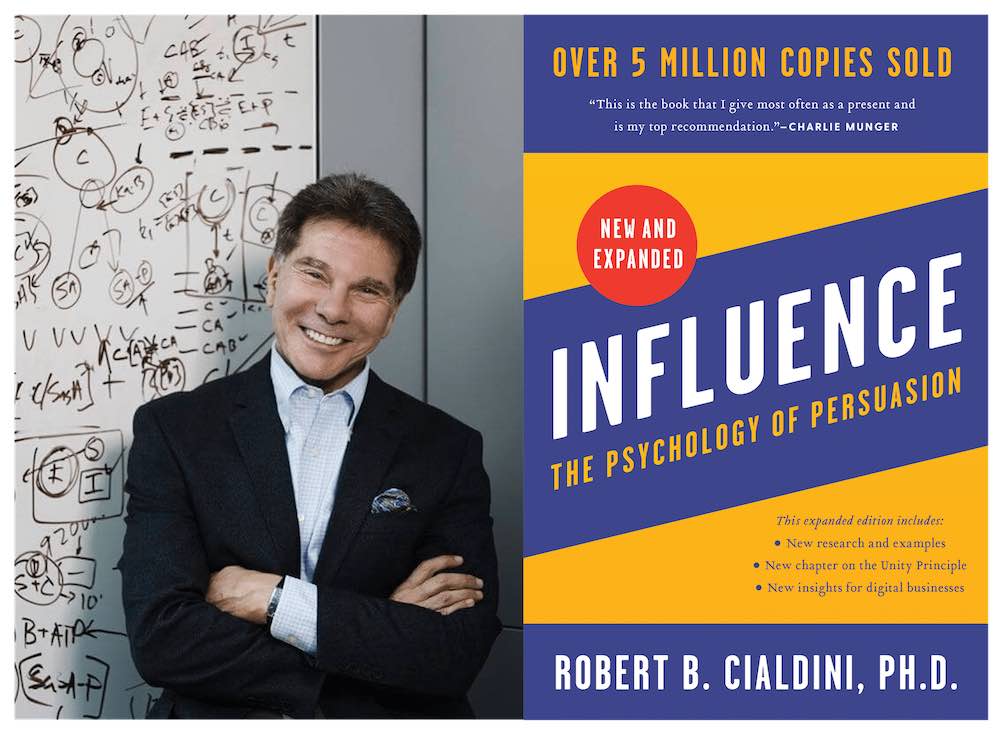The Six Principles of Influence (also known as Six Weapons of Influence) were created by Robert Cialdini, Emeritus Professor of Regents of Psychology and Marketing at Arizona State University. He published them in his respected 1984 book “Influence: The Psychology of Persuasion”.
The six principles are as follows:
1. Reciprocity
As humans, we generally aim to return favors, pay back debts, and treat others as they treat us. According to the idea of reciprocity, this can lead us to feel obliged to offer concessions or discounts to others if they have offered them to us. This is because we’re uncomfortable with feeling indebted to them.
For example, if a colleague helps you when you’re busy with a project, you might feel obliged to support her ideas for improving team processes. You might decide to buy more from a supplier if they have offered you an aggressive discount. Or, you might give money to a charity fundraiser who has given you a flower in the street.
2. Commitment (and Consistency)
Cialdini says that we have a deep desire to be consistent. For this reason, once we’ve committed to something, we’re then more inclined to go through with it.
For instance, you’d probably be more likely to support a colleague’s project proposal if you had shown interest when he first talked to you about his ideas.
3. Social Proof
This principle relies on people’s sense of “safety in numbers.”
For example, we’re more likely to work late if others in our team are doing the same, put a tip in a jar if it already contains money, or eat in a restaurant if it’s busy. Here, we’re assuming that if lots of other people are doing something, then it must be OK.
We’re particularly susceptible to this principle when we’re feeling uncertain, and we’re even more likely to be influenced if the people we see seem to be similar to us. That’s why commercials often use moms, not celebrities, to advertise household products.
4. Liking
Cialdini says that we’re more likely to be influenced by people we like. Likability comes in many forms – people might be similar or familiar to us, they might give us compliments, or we may just simply trust them.
Companies that use sales agents from within the community employ this principle with huge success. People are more likely to buy from people like themselves, from friends, and from people they know and respect.
5. Authority
We feel a sense of duty or obligation to people in positions of authority. This is why advertisers of pharmaceutical products employ doctors to front their campaigns, and why most of us will do most things that our manager requests.
Job titles, uniforms, and even accessories like cars or gadgets can lend an air of authority, and can persuade us to accept what these people say.
6. Scarcity
This principle says that things are more attractive when their availability is limited, or when we stand to lose the opportunity to acquire them on favorable terms.
For instance, we might buy something immediately if we’re told that it’s the last one, or that a special offer will soon expire.
Powerful Marketing Words
There are words which have special meaning within each culture and carry power where they are used.
They are also sometimes called power words, especially by sales people. Words used in sales often appeal to basic needs, such as:
- Safety: guaranteed, proven
- Control: powerful, strong
- Understanding: because, as, so, truth, real
- Greed: money, cash, save, win, free, more
- Health: safe, healthy, well
- Belonging: belong, happy, good, feel
- Esteem: exclusive, only, admired
- Identity: you, (their name), we
- Novelty: new, discover
Negative words are also used in this context to scare people into action. These often address those self-same needs, but now from the opposite direction:
- Safety: dangerous,
- Control: uncertain, scarce
- Understanding: change, complicated
- Greed: lose, stolen
- Health: unhealthy, sick, old
- Belonging: wrong, alone, rejected
- Esteem: ridicule, laughed at
- Identity: they, he
- Novelty: outdated, unfashionable
One study revealed that the 5 words below increase the likelihood of selling your product:
• Fair Price – increases 7%
• We care – increases by 11%
• Fair treatment – increases by 20%
• Quality – increases by 30%
• Competence – increases by 33%
Other words and actions that enlarge the veins
Because
Buy this product because it is good.
Providing a justification for the customer to buy, even if that justification is a matter of fact, increases the possibility of the customer to buy. People are not very rational when they shop and are often just looking for any reason to justify buying.
Act Now, Buy Now, Click Here, Come to our store
These and other words of action (Call to Action) are very important because people like to be told clearly what to do. Whenever you do an online advertising or newspaper or TV ad do not forget to give the order you want to give to the customer:
Want them to buy your product? Say: Click here to buy, Come to our store and buy, Call and make your reservation, order yours and so on.
Everything Included/ Everything you Need
Establish that your product or service is all your customers will have to buy in order to achieve their goal.
Example: The only soap you need.
Proved / Actual Results
Everyone is looking for results.
Warranty or Risk Reversal
Offer guarantees, they can do wonders for your product or service. See the text below from the book: Getting Everything You Can Out of Everything You Have Got by Jay Abraham:
The biggest secret to success in business or career is to always maintain the edge in everything you do. Logical sounding, yes, but infrequently understood. Even less frequently practiced. One of the biggest “competitiveedge” advantages you’ll ever gain is to always make it easier for the client to say “yes” than it is for them to say “no.” You do it by taking away the financial, psychological or emotional risk factors that are always attached (stated or unstated) to virtually any decision-making proposition you ever ask a client to make. When you remove the risk for anyone deciding to do business with you it
results in a powerful advantage in your business and financial success.
(…)
An opal dealer I work with has a very daring guarantee: Anyone buying a stone from her takes it anywhere – to a friend, another jeweler, anywhere – and if they’re dissatisfied, unhappy or just plain change their mind, it’s no problem. They can get a full 100% money-back guarantee anytime within one year.
No other opal dealer in the country makes a claim like that. She outsells all her legitimate competition.
Risk reversal helps people decide to act and act now, today, immediately, without fear or concern.
(…)
When you start using risk reversal this way, your business almost always shoots up immediately and stays up. You close more sales, sell larger units of purchase and sell more often when people stop worrying about making the wrong or a bad purchasing decision.
When you use risk reversal, you are basically telling your client that they will never again make a bad or incorrect or dangerous purchasing decision. That’s a powerfully persuading point to make.
Stélio Inácio
This text is part of the book Escaping Poverty – 5 Steps to Start your Own Business


